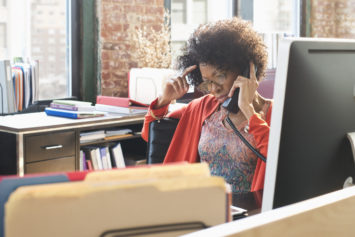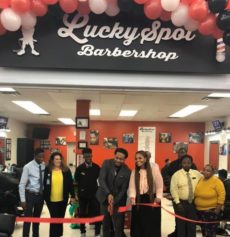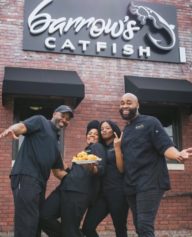Despite the Trump administration’s disdain for renewable energies and promotion of fossil fuels like coal, the current revolution in clean energy is showing no signs of slowing down. The Solar Foundation recently reported the number of solar jobs increased by an unprecedented 25 percent from 2015 to 2016 to produce a total of 260,077 workers nationwide. During the same period, the number of solar jobs increased in 44 states—including a 15-percent increase in the Atlanta metro area alone—and, in 2016, the American solar industry totaled $154 billion in economic activity. Similarly, the production of wind power has tripled over the past decade and the U.S. Bureau of Labor Statistics lists wind turbine technician as the fastest-growing occupation in the country.
Given such energetic trends, some believe it is essential for the Black community to become more involved in the renewable energy movement, an arena where only an estimated 7 percent of solar workers are African-American.
“The idea that we can just pin our future on dirty energy going forward makes no sense in terms of dealing with climate change and greenhouse gases,” says Dr. Robert Bullard, Distinguished Professor of Urban Planning and Environmental Policy at Texas Southern University. An author of 17 books on environment-related issues, Bullard is often described as “the father of environmental justice.” What also makes no sense, he continues, is “most of the fossil fuel industries are actually located in or near communities of color. African-American communities are not only bombarded with the impact of the greenhouse gases” but also with “the impact of all the other dangerous pollutants coming out of those smokestacks. So, it makes a lot of sense for African-Americans and poor communities to really push for cleaner and more renewable energy, not just because of climate but also because of health.”
Unlike fossil fuels coal and oil, which pollute and draw upon finite resources, solar and wind are clean, renewable energy sources that create no pollution and never run out. Solar power pulls energy from sunlight and transforms it into power through photovoltaic cells that convert light into electric current or by way of lenses and mirrors that concentrate sunlight into a small, directed beam. Wind power is a process by which a turbine — a sophisticated, modern-day version of a windmill commonly with three blades and ranging from 80 to 250 feet tall — harnesses the wind’s kinetic energy and converts it into electricity.
The benefits of such renewables — less pollution, increased employment, lower energy costs, better health — are not going unnoticed. A November 2015 poll by Green For All revealed an overwhelming majority of African-Americans support a clean-energy strategy to address climate change and believe it will create substantial jobs while reducing energy bills.
“Any economy that is growing and relatively young where you can make investments that will pay off in terms of both money and health are areas African-Americans need to take advantage of,” insists Bullard, noting the remaining amount of Black-owned land in the country, particularly in the South. “It’s important we take advantage of the landholdings we have, not just in terms of sustainable agriculture but in terms of leasing and developing projects in wind and solar energy. I don’t think we’ve taken advantage of that at the levels we should.”
As with any industry, there are significant barriers to entry, particularly for African-Americans, be they resources, investment, information or resistant networks. Accordingly, the issue is often not if we should be involved in an industry but how we can get involved.
Bullard believes “we should be getting investments in clean energy and renewables from African-Americans who have money” to spur both jobs and development in our community, and that “resources should be made available to those African-American entrepreneurs that want to get into this industry since, often times, we get locked out.”
In the Washington D.C. area, some are already knocking these barriers down. In 2009, former NBA player Mark Davis founded WDC Solar, one of the nation’s first African-American-owned solar panel installation companies. At the time, the Obama administration’s economic stimulus bill promoted the production of renewable energies and enabled Davis to attract both government funding and private investment. Along with servicing paying clients, WDC Solar specializes in installing panels in low-income communities for free while training those in need of employment in this growing field. Over the past five years — using tax credits, private funds and partnerships with the likes of the DC Sustainable Energy Utility — the company has installed over 1,000 systems at no cost to low-income homeowners while training and employing local residents.
“It was very difficult getting up and running, and trying to keep my head above water while competing with the energy giants in the area,” acknowledges Davis, explaining how the “low-income program we developed really provided us a niche that other local companies were not interested in.” He noted such common barriers to entry as time, the training of a local workforce and the need for large, monthly capital investments. “We started out doing small residential systems and now, we are doing much larger commercial systems” that take millions to finance, “so, you want to have a couple of sources you can call on that will finance your commercial systems.”
Despite his success at effectively managing the substantial investment and resources required — the expanding company already has a presence n DeKalb County, Ga., Davis’ home state — the former professional baller is most proud of providing clean jobs, reduced energy costs and an effective solar lifeline to a community that needs it most.
“That money remains in the community,” says Davis, regarding it as a “substantial economic advantage in low-income areas when you have those funds returning to those households.” He also acknowledges the numerous “people we have trained who have gone on to work for both us and other companies.”
The opportunity for some who might not otherwise have it, says Davis, has been “life changing.
“Now, they have a career path.”


